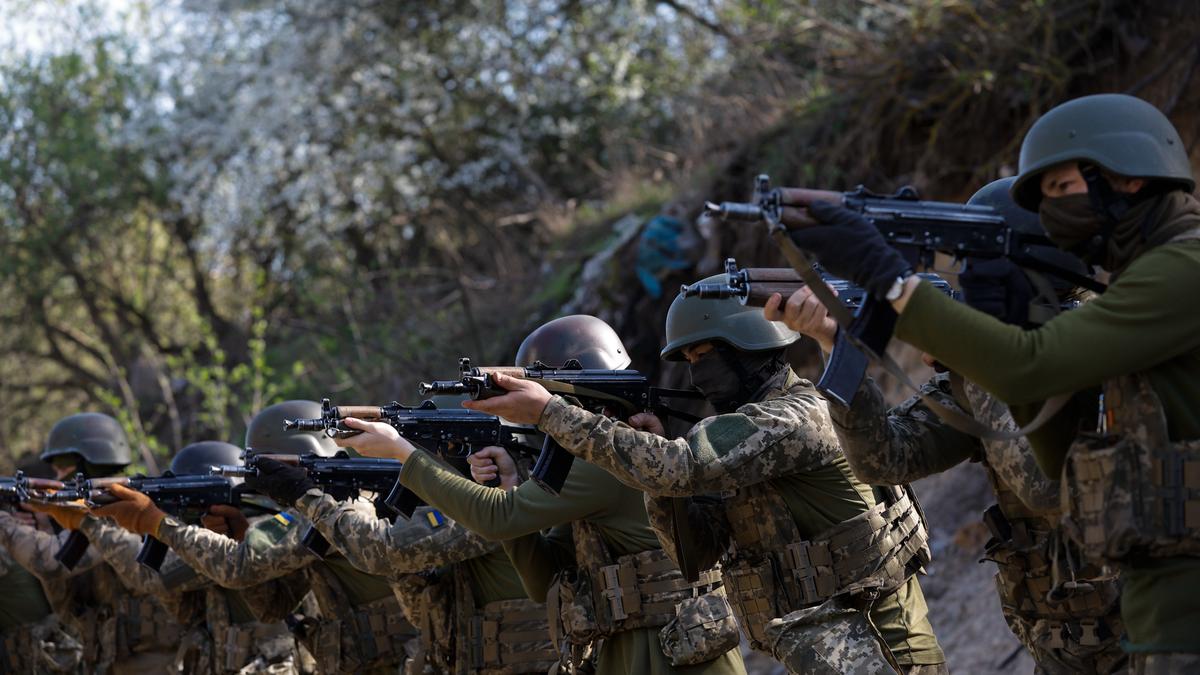Images of armed troops on the streets of a Russian border village flooded social media in mid-March. The men, kitted out in helmets and bulletproof vests, were not Ukrainian — but neither were they part of the Russian military. Drone footage showed the soldiers gathering around a local administration building and tearing down the Russian tricolour. Later, as the men gathered for photos, the flag lay trampled beneath their feet.
The incursion was the work of Russian battalions fighting against the Kremlin on the side of Ukraine. Today, there are several such units operating within the Ukrainian army, each striving for a common goal: the overthrow of Vladimir Putin.
Kyiv is keen to stress the independence of the units carrying out cross-border operations. As Ukraine’s military intelligence spokesman, Andriy Yusov, told journalists in March, “On Russian territory, [these men] act absolutely autonomously… and pursue the goals of their own social and political programme”.
The raids have been a modest success, both serving to humiliate the Russian military and striking a powerful propaganda blow. Yet Moscow’s more aggressive approach in Ukraine’s northeastern Kharkiv region, as well as new fortifications, make further such incursions less likely.
Nonetheless, Ukraine’s Russian troops continue to play an important and unique battlefield role, even as their long-term future remains uncertain.
A political purpose
Russian militia groups first appeared in Ukraine in 2014, when Moscow’s forces illegally annexed the Crimean Peninsula and began funding separatist troops in the country’s east. Russian fighters volunteered to fight against these Moscow-backed troops alongside Kyiv’s forces.
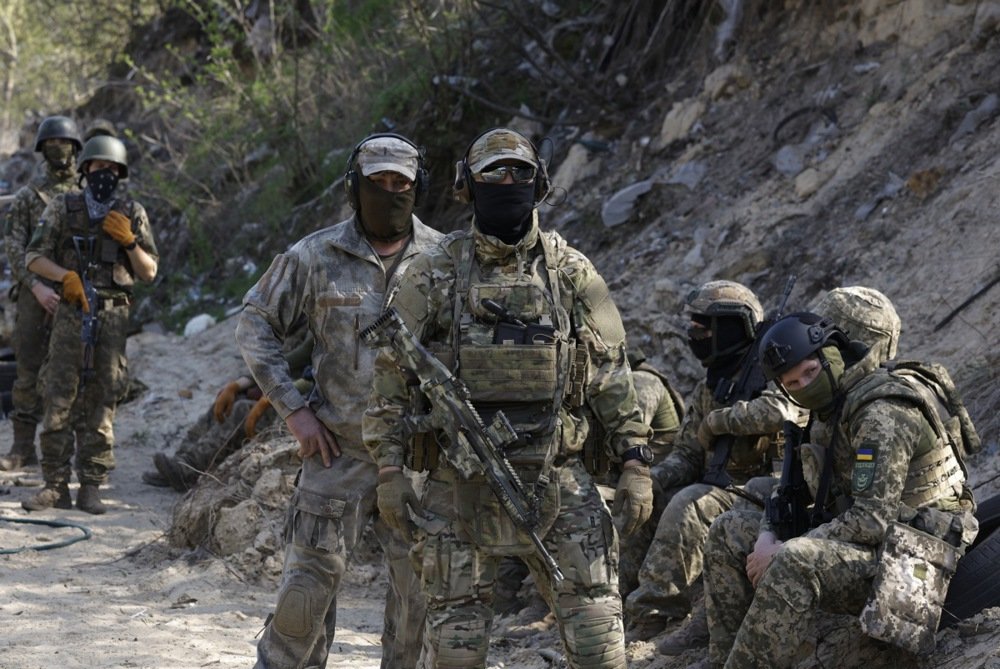
Members of the Siberian Battalion attend their military training on a shooting range near Kyiv, Ukraine, 10 April 2024. Photo: EPA-EFE/SERGEY DOLZHENKO
But as the conflict slowed, many of these fighters dispersed. It wasn’t until the start of Moscow’s full-scale invasion of Ukraine in February 2022 that a new wave of Russian volunteers emerged.
New units were quickly formed to cater to the growing number of Russians who wanted to fight for Kyiv. The Freedom of Russia Legion was founded in March 2022; the Siberian Battalion, largely comprised of soldiers from Russia’s ethnic minorities, followed seven months later. There are also four ethnic Chechen battalions which include men with Russian citizenship from the North Caucasus, as well as a large contingent from the Chechen diaspora.
“These incursions into the Belgorod region force Russia to redeploy considerable assets to protect the border.”
Unlike in 2014, when Ukraine had far less operational oversight of the foreign militias fighting alongside its own troops, most of these units are now formally part of the Armed Forces of Ukraine (AFU) and fight alongside them on the frontline. Two paramilitary groups — the Russian Volunteer Corps, led by far-right Russian nationalist Denis Kapustin, and the Chechen Sheikh Mansur Battalion, are not formally under the command of the AFU.
The various daring cross-border raids carried out by these groups both last summer and in March, have attracted international attention. And while the operational scope of such raids is limited, they have nonetheless enjoyed a certain amount of success, according to Dr. András Rácz, a senior research fellow at the German Council on Foreign Relations’ Center for Order and Governance in Eastern Europe, Russia, and Central Asia.
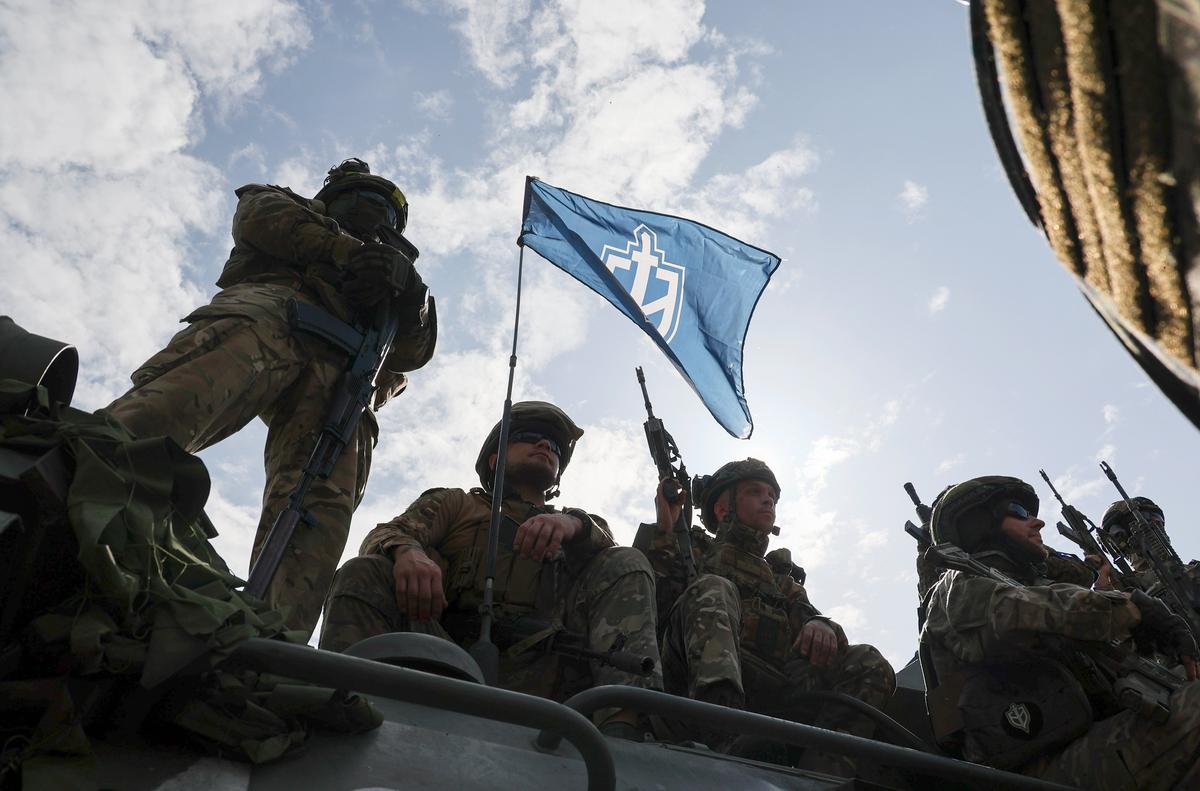
Members of the Russian Volunteer Corps and Freedom of Russia Legion, 24 May 2023. Photo: EPA-EFE / SERGEY KOZLOV
“These incursions into the Belgorod region force Russia to redeploy considerable assets to protect the border,” Rácz told Novaya Gazeta Europe. “The more units they have inside Russia protecting the border, the fewer units they are able to deploy to Ukraine for offensive purposes.”
It is of paramount importance to Kyiv that those carrying out these raids on Russian soil are themselves Russian citizens. Ukrainian politicians have been forced to tread a delicate political line: both avoiding accusations that they are “escalating” the conflict with Moscow, while simultaneously attempting to defend the country against an enemy intent on destroying its existence. Deploying Russian soldiers with the remit to act independently on home soil grants Kyiv an important layer of distance and deniability.
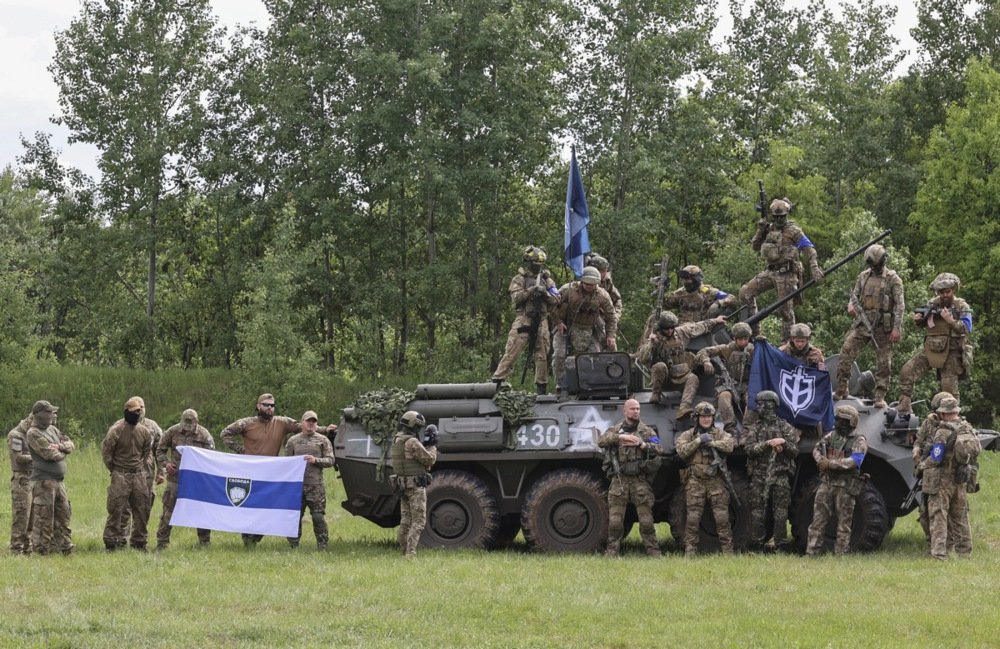
Members of the Russian Volunteer Corps and Freedom of Russia Legion hold a meeting with the media not far from the Ukraine-Russia border in Kharkiv’s area, northeastern Ukraine, 24 May 2023, amid the Russian invasion. Photo: EPA-EFE/SERGEY KOZLO
Learning from experience
Similar raids, however, are likely to become less successful in future. As well as a fresh Russian offensive in the Kharkiv region — where troops have previously made incursions — that began last month making it harder for raiding parties to slip across the border, Russian forces are seemingly also learning from experience.
In June 2023, a few weeks after Russian volunteer forces made their first incursions into the Belgorod region, Vladimir Putin reassured Russians that the border would be strengthened to defend against attacks by “Ukrainian terrorists”, promising without going into any detail that the issue would “be solved one way or another”.
With their capacity to launch cross-border raids curtailed, Russian volunteer units will need a new focus. But that doesn’t necessarily mean that they will become less valuable to Kyiv.
In mid-March Russia’s Defence Ministry announced that it had routed an attack by “Ukrainian saboteurs”, men who likely belonged to Russian volunteer militias fighting for Kyiv. Russian officials claimed to have killed tens of paramilitary fighters and captured significant military equipment, although it has not been possible to verify these claims.
Several weeks later, the Main Intelligence Directorate of Ukraine’s Defence Ministry said that Russia was strengthening its border defences in the Kursk, Belgorod and Bryansk regions as a direct result of a second wave of raids, priming troops to defend urban areas and identify sabotage and reconnaissance groups.
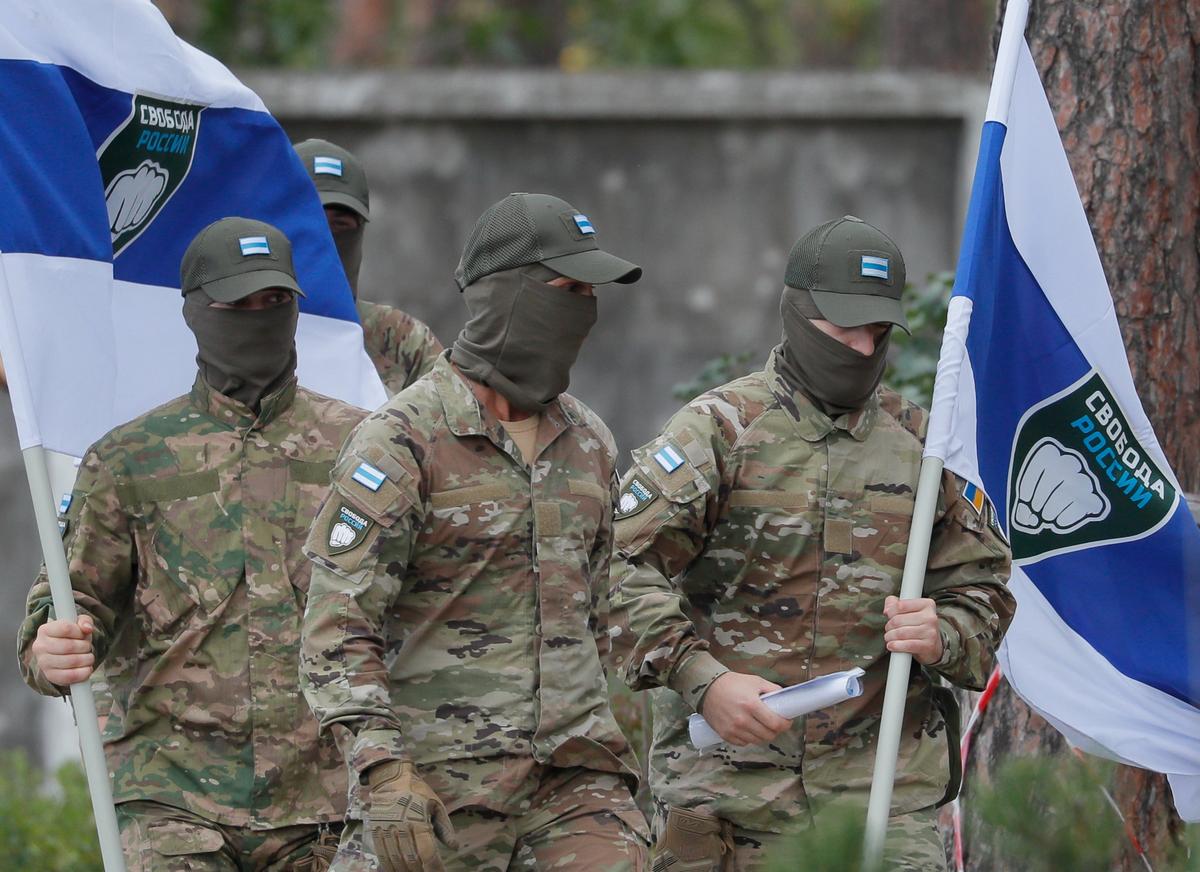
Members of the Freedom of Russia Legion carrying their flag walk through the city of Irpin near Kyiv, Ukraine, 31 August 2022. Photo: EPA-EFE / SERGEY DOLZHENKO
“My guess is that a first incursion would succeed due to the element of surprise. The second large incursion could succeed due to a more diversified force: [the militias] attacked more than one point, when Russian border protection was spread quite thinly,” says Rácz. “But when it comes to future incursions, I think the Russians are learning. One should not underestimate them.”
A common enemy
With their capacity to launch cross-border raids curtailed, Russian volunteer units will need a new focus. But that doesn’t necessarily mean that they will become less valuable to Kyiv.
Many of the volunteers that join the legion have no significant military experience, says Dr. Huseyn Aliyev, a lecturer at the University of Glasgow who focuses on non-state armed groups. The AFU has invested considerable time, effort, and money in training and arming such raw recruits.
“Fighters have adopted the general message of these battalions, which is that peaceful opposition to Putin’s regime simply is not working.”
But the main value of these units has always been in their propaganda appeal, both internationally and domestically. Battalion leaders are interviewed on Ukrainian TV and on social media, and while images of cross border militia raids played well with Ukrainian viewers, depicting a country that is dealing blows as well as taking them, showing Russians fighting against the Putin regime has a merit all of its own.
“They hold this symbolic value of being Russians fighting Russians, and that’s important for Ukrainians to show to the world, and to domestic audiences. There is a lot of social media coverage of these groups; their leaders give a lot of interviews,” says Aliyev. “Ukraine is likely to take very good care of them.”
It is no surprise therefore that the Freedom of Russia Legion is among the units currently deployed in Kharkiv, fighting off Moscow’s latest assault.
The soldiers themselves are for the most part keen to continue fighting. For those who may wish to leave, the threat of treason charges in Moscow looms large. But most volunteer fighters have taken significant risks to enlist and did so with a clear ideological motivation.
“Fighters have adopted the general message of these battalions, which is that peaceful opposition to Putin’s regime simply is not working,” says Aliyev. “With that, the only way to deal with the Kremlin is with weapons in their hands.”
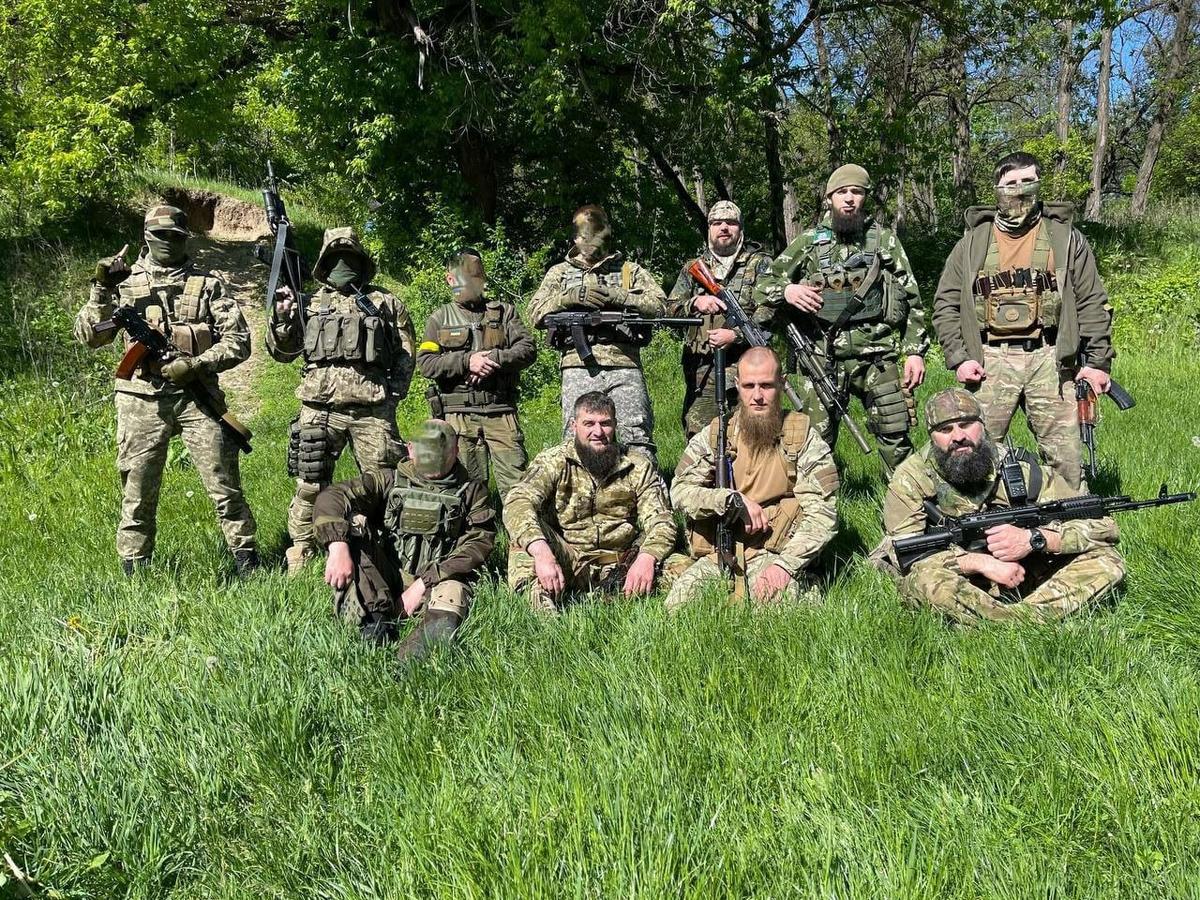
Members of the Sheikh Mansur Battalion. Photo: Batalon_Shaiha_Mansura / Telegram
When it comes to a broader ideology, the path forward is less clear. Volunteers come from a wide range of political backgrounds and beyond the desire to overthrow the Kremlin, there is little common ground. Although some formations are loosely linked to certain ideologies, not every soldier will neatly fit a particular profile, with some signing up to certain units simply as they offered the best way to fight back against the Kremlin at a given time.
“Within Chechen units, there is a loose idea that Russia is an imperial force that’s suppressing the Chechen people, and we need to wage an armed struggle to liberate the North Caucasus. That idea can unite a lot of people,” says Mark Youngman, whose company, Threatologist, analyses Eurasian security risks, specialising in insurgencies in the North Caucasus.
“If you’re not bothered about a long-term project, you can easily collaborate across religious, secular, political lines,” says Youngman.
“The more detailed ideology comes with what comes after. Do we build an Islamic state? Do we build a separatist state? Do we try to enter the United Nations? And that is where you will see people going in all sorts of different directions,” he adds.
For now, focusing on an all-encompassing short-term goal — pushing back invading Russian troops to ensure a Ukrainian victory — ensures that these ideological fissures won’t have an operational impact. If anything, the lack of a long-term vision ensures that volunteer units remain a broad church that can unite more people behind a single goal.
“If you’re not bothered about a long-term project, you can easily collaborate across religious, secular, political lines,” says Youngman.
“It’s much easier to argue against Russian corruption, Russian imperialism, and the Putin state, than it is to say what comes next. No one needs to resolve those issues while we’re still at the stage of ‘how do we get Putin out?’”
